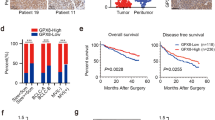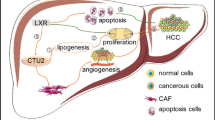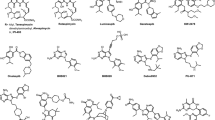Abstract
Purpose
In this study we aimed to assess the anti-tumor effect of co-inhibition of Aurora kinase A (AURKA) and heat shock transcription factor 1 (HSF1) on hepatocellular carcinoma (HCC), as well as to explore the mechanism involved.
Methods
Expression of AURKA and HSF1 in primary HCC tissues and cell lines was detected by immunohistochemistry (IHC), qRT-PCR and Western blotting. AURKA was knocked down in HepG2 and BEL-7402 HCC cells using lentivirus-mediated RNA interference. Next, CCK-8, clone formation, transwell and flow cytometry assays were used to assess their viability, migration, invasion and apoptosis, respectively. The expression of proteins related to cell cycle progression, apoptosis and endoplasmic reticulum stress (ERS) was analyzed using Western blotting. In addition, in vivo tumor growth of HCC cells was assessed using a nude mouse xenograft model, and the resulting tumors were evaluated using HE staining and IHC.
Results
Both AURKA and HSF1 were highly expressed in HCC tissues and cells, while being negatively related to HCC prognosis. Knockdown of AURKA significantly inhibited the colony forming and migrating capacities of HCC cells. In addition, we found that treatment with an AURKA inhibitor (Danusertib) led to marked reductions in the proliferation and migration capacities of the HCC cells, and promoted their apoptosis. Notably, combined inhibition of AURKA and HSF1 induced HCC cell apoptosis, while increasing the expression of ERS-associated proteins, including p-eIF2α, ATF4 and CHOP. Finally, we found that co-inhibition of AURKA and HSF1 elicited an excellent in vivo antitumor effect in a HCC mouse model with a relatively low cytotoxicity.
Conclusions
Combined inhibition of AURKA and HSF1 shows an excellent anti-tumor effect on HCC cells in vitro and in vivo, which may be mediated by ERS. These findings suggest that both AURKA and HSF1 may serve as targets for HCC treatment.







Similar content being viewed by others
Data availability
The datasets used and/or analyzed during the current study are available from the corresponding author upon reasonable request.
Abbreviations
- AURKA:
-
aurora kinase A
- HSF1:
-
heat shock transcription factor 1
- HCC:
-
hepatocellular carcinoma
- IHC:
-
immunohistochemistry
- ERS:
-
endoplasmic reticulum stress
- FBS:
-
fetal bovine serum
- siRNA:
-
small-interfering RNA
- CCK-8:
-
Cell Counting Kit-8
- HE:
-
hematoxylin-eosin
- UPR:
-
unfolded protein response
References
F. Bray, J. Ferlay, I. Soerjomataram, R.L. Siegel, L.A. Torre, A. Jemal, Global cancer statistics 2018: GLOBOCAN estimates of incidence and mortality worldwide for 36 cancers in 185 countries. CA Cancer J. Clin. 68, 394–424 (2018)
A. Forner, J.M. Llovet, J. Bruix, Hepatocellular carcinoma. Lancet 379, 1245–1255 (2012)
Y.A. Ghouri, I. Mian, J.H. Rowe, Review of hepatocellular carcinoma: Epidemiology, etiology, and carcinogenesis. J. Carcinog. 16, 1 (2017)
T. Marumoto, D. Zhang, H. Saya, Aurora-A - a guardian of poles. Nat. Rev. Cancer 5, 42–50 (2005)
A.A. Ye, J. Deretic, C.M. Hoel, A.W. Hinman, D. Cimini, J.P. Welburn et al., Aurora A kinase contributes to a Pole-based error correction pathway. Curr. Biol. 25, 1842–1851 (2015)
H. Zhang, X. Chen, Y. Jin, B. Liu, L. Zhou, Overexpression of Aurora-A promotes laryngeal cancer progression by enhancing invasive ability and chromosomal instability. Eur. Arch. Otorhinolaryngol. 269, 607–614 (2012)
J.A. Goos, V.M. Coupe, B. Diosdado, P.M. Delis-Van Diemen, C. Karga, J.A. Beliën et al., Aurora kinase A (AURKA) expression in colorectal cancer liver metastasis is associated with poor prognosis. Br. J. Cancer 109, 2445–2452 (2013)
W. Zhang, D. Xia, Z. Li, T. Zhou, T. Chen, Z. Wu et al., Aurora-A/ERK1/2/mTOR axis promotes tumor progression in triple-negative breast cancer and dual-targeting Aurora-A/mTOR shows synthetic lethality. Cell Death Dis. 10, 606 (2019)
K. Zhang, J. Chen, D. Chen, J. Huang, B. Feng, S. Han et al., Aurora-A promotes chemoresistance in hepatocelluar carcinoma by targeting NF-kappaB/microRNA-21/PTEN signaling pathway. Oncotarget 5, 12916–12935 (2014)
R. Reiter, P. Gais, U. Jütting, M.K. Steuer-Vogt, A. Pickhard, K. Bink et al., Aurora kinase A messenger RNA overexpression is correlated with tumor progression and shortened survival in head and neck squamous cell carcinoma. Clin. Cancer Res. 12, 5136–5141 (2006)
M. Guo, S. Lu, H. Huang, Y. Wang, M.Q. Yang, Y. Yang et al., Increased AURKA promotes cell proliferation and predicts poor prognosis in bladder cancer. BMC Syst. Biol. 12(Suppl 7), 118 (2018)
L.Y. Yang, C.Y. He, X.H. Chen, L.P. Su, B.Y. Liu, H. Zhang, Aurora kinase A revives dormant laryngeal squamous cell carcinoma cells via FAK/PI3K/Akt pathway activation. Oncotarget 7, 48346–48359 (2016)
L. Yang, Q. Zhou, X. Chen, L. Su, B. Liu, H. Zhang, Activation of the FAK/PI3K pathway is crucial for AURKA-induced epithelial-mesenchymal transition in laryngeal cancer. Oncol. Rep. 36, 819–826 (2016)
G.W. Fearnley, G.A. Smith, I. Abdul-Zani, N. Yuldasheva, N.A. Mughal, S. Homer-Vanniasinkam et al., VEGF-A isoforms program differential VEGFR2 signal transduction, trafficking and proteolysis. Biol. Open 5, 571–583 (2016)
M.L. Mendillo, S. Santagata, M. Koeva, G.W. Bell, R. Hu, R.M. Tamimi et al., HSF1 drives a transcriptional program distinct from heat shock to support highly malignant human cancers. Cell 150, 549–562 (2012)
S. Li, W. Ma, T. Fei, Q. Lou, Y. Zhang, X. Cui et al., Upregulation of heat shock factor 1 transcription activity is associated with hepatocellular carcinoma progression. Mol. Med. Rep. 10, 2313–2321 (2014)
S. Dayalan Naidu, A.T. Dinkova-Kostova, Regulation of the mammalian heat shock factor 1. FEBS J. 284, 1606–1627 (2017)
X.Q. Bao, G.T. Liu, Bicyclol protects HepG2 cells against D-galactosamine-induced apoptosis through inducing heat shock protein 27 and mitochondria associated pathway. Acta Pharmacol. Sin. 31, 219–226 (2010)
C. Huang, L. Wang, H. Song, C. Wu, Interactive effects of AURKA polymorphisms with smoking on the susceptibility of oral cancer. Artif. Cells Nanomed. Biotechnol. 47, 2333–2337 (2019)
M.H. Townsend, Z.E. Ence, A.M. Felsted, A.C. Parker, S.R. Piccolo, R.A. Robison et al., Potential new biomarkers for endometrial cancer. Cancer Cell Int. 19, 19 (2019)
A. Jacobsen, L.J.W. Bosch, S.R. Martens-de Kemp, B. Carvalho, A.H. Sillars-Hardebol, R.J. Dobson et al., Aurora kinase A (AURKA) interaction with Wnt and Ras-MAPK signalling pathways in colorectal cancer. Sci. Rep. 8, 7522 (2018)
A.R. Barr, F. Gergely, Aurora-A: the maker and breaker of spindle poles. J. Cell Sci. 120, 2987–2996 (2007)
C. Dai, S.B. Sampson, HSF1: Guardian of proteostasis in cancer. Trends Cell. Biol. l26, 17–28 (2016)
L. Dara, C. Ji, N. Kaplowitz, The contribution of endoplasmic reticulum stress to liver diseases. Hepatology 53, 1752–1763 (2011)
J.W. Lin, P. Liu, T.X. Xiang, X.Z. Li, F.J. Guo, Effects of transcription factor XBP1S on cell proliferation and apoptosis of hepatoma HepG2 cells. Tumor 31, 11–16 (2011)
Y. Jin, S. Zhang, R. Tao, J. Huang, X. He, L. Qu et al., Oral exposure of mice to cadmium (II), chromium (VI) and their mixture induce oxidative- and endoplasmic reticulum-stress mediated apoptosis in the livers. Environ. Toxicol. 31, 693–705 (2016)
H. Guo, F. Ren, L. Zhang, X. Zhang, R. Yang, B. Xie et al., Kaempferol induces apoptosis in HepG2 cells via activation of the endoplasmic reticulum stress pathway. Mol. Med. Rep. 13, 2791–2800 (2016)
W. Rozpedek, D. Pytel, B. Mucha, H. Leszczynska, J.A. Diehl, I. Majsterek, The role of the PERK/eIF2α/ATF4/CHOP signaling pathway in tumor progression during endoplasmic reticulum stress. Curr. Mol. Med. 16, 533–544 (2016)
Funding
This work was supported by grants from the Nanjing Municipal Science and Technology Committee of Jiangsu Province, China (grant number: 201803050) and the Jiangsu Post-doctoral Research Funding Program, China (grant number: 2020Z305).
Author information
Authors and Affiliations
Contributions
ZS and XH conceived and designed this study; LY, HZ, XJ and CJ performed the experiments and data analyses; ZS and XZ drafted the manuscript; XH provided critical comments, suggestions and revised the manuscript. All authors read and approved the final version of the manuscript.
Corresponding author
Ethics declarations
Conflict of interest
The authors declare that they have no competing interests.
Ethics approval and consent to participate
This study was approved by the Ethics Committee of Jinling Hospital, and written informed consent was obtained from all participating patients. The animal experiments were approved by the Ethics Committee of Jinling Hospital (approval no: 2020JLHGKJDWLS-140).
Consent for publication
Not applicable.
Additional information
Publisher’s Note
Springer Nature remains neutral with regard to jurisdictional claims in published maps and institutional affiliations.
Rights and permissions
About this article
Cite this article
Shen, Z., Yin, L., Zhou, H. et al. Combined inhibition of AURKA and HSF1 suppresses proliferation and promotes apoptosis in hepatocellular carcinoma by activating endoplasmic reticulum stress. Cell Oncol. 44, 1035–1049 (2021). https://doi.org/10.1007/s13402-021-00617-w
Received:
Accepted:
Published:
Issue Date:
DOI: https://doi.org/10.1007/s13402-021-00617-w




